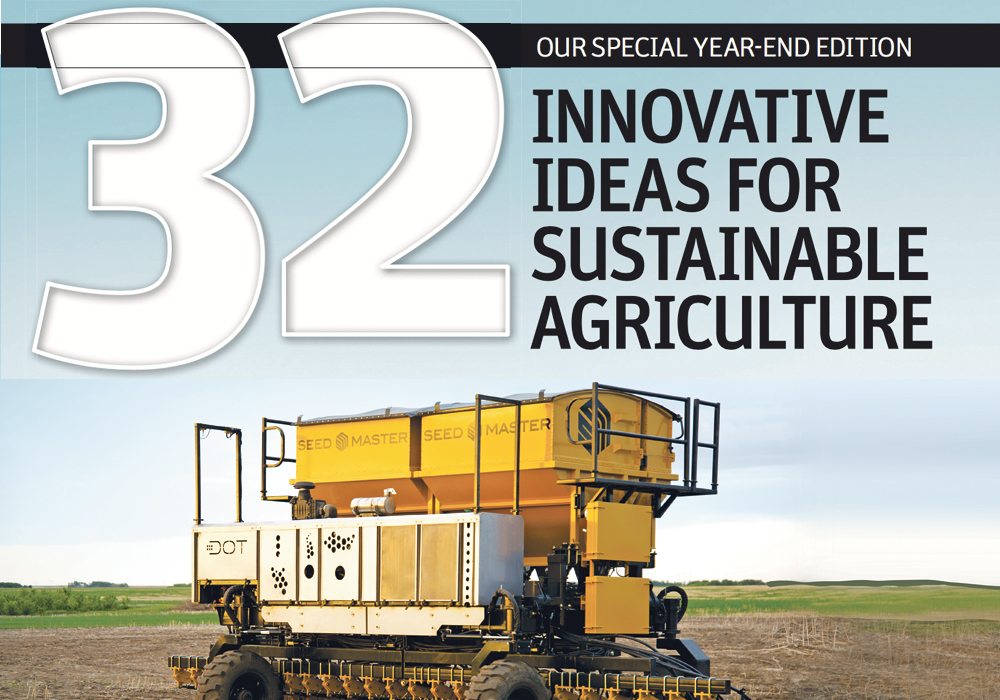A technology company based in the United Kingdom has developed a new product that monitors temperature and moisture levels in stored grain and sends wireless data to a smartphone, laptop or home computer.
BeanIOT is a bean-sized remote sensing device that can monitor conditions in stored grain and warn the user of potential spoilage inside the bin.
The sensors are roughly the size of a kidney bean and are capable of monitoring grain temperatures, humidity levels, insect movements and other conditions that could affect the value of stored grain.
Read Also

Phosphate prices to remain high
Phosphate prices are expected to remain elevated, according to Mosaic’s president.
Digital data generated by the beans is sent wirelessly and can be displayed graphically for quick and easy assessment.
The rechargeable units can be deployed throughout stored grain masses and have a battery life of up to 14 months.
Other stories in The 2017 Innovation Issue:
- New genetic tools offer way to restore cattle vigour
- Technology can help breed better cattle
- Biotech companies prospecting for microscopic gold mines
- Bee buzzes critical to calculating crop pollination
- Fungus could aid plant growth, reclaim oil sites
- Cracking the megapest genetic code
- Genetic mapping vs. genome sequencing
- French robot prowls the chicken coop so you don’t have to
- New laser technology proves successful for B.C. orchard
- High-tech deterrent devices protect crops from … intruding elephants?
- Diamondback moths focus of Cornell study
- VIDEO: Print your own parts?
- Bees may be serving up humanity’s next big food … and it isn’t honey
- Big doubts about big data
- The little plane that did
- Soil mapping soon to be more usable
- Managing fields could soon move to plant level
- GM pollen: it gets around
- Autonomous vehicles not on the radar for most farmers
- Nanotechnology to alter animal health, food systems
- As big data comes to the farm, are policy makers keeping up?
- Farmers not rushing to grab digital tools: survey
- Connecting the DOTs
- Hands-free field test
- Researcher understands farmer doubts about hands-free farming
- The trouble with telematics
- Sensor sensibility
- The discovery that could shake up the beer industry
- Grow your own clothes
- Blockchain technology offers food safety, traceability and more
- Supercluster makes big innovation pitch
- Quicker, cheaper biofuel production in the works
- Alternatives to livestock antibiotics are difficult to assess
- A revolution is coming
The beans are reusable and can be put to use quickly with limited set-up time. They are currently being tested commercially in the United Kingdom.
Developers say they should be suitable for North American storage systems, although it remains to be seen how beans that have been deployed in large storage facilities would be recovered for reuse.
Mechanical damage caused by augers and grain conveyors is another potential pitfall.
Andrew Holland, founder and chief operating officer of RF Module and Optical Design Limited, the Cambridge-based company that developed the Bean IOT system, said the beans can be deposited throughout stored grain, providing information from numerous points within the storage area.
“Density of deployment is key,” said Holland.
“Our system provides lots of physical locations across the grain stack, so the farmer is not going to miss any untoward activity like hot spots, mould growth, insect infestation and so forth.”
Although BeanIOT has yet to prove its value in the North American marketplace, the technology is an example of how remote data collection systems with wi-fi connectivity can be used to make informed farm management decisions.
Developers say data collected by the beans is displayed in a user-friendly visual format that allow managers to identify problems quickly and take preventive action before spoilage occurs.
For example, grain temperature data collected at various points in a stored grain mass can be displayed as a thermal map that shows hot spots where spoilage is most likely to occur.
Additional data generated by the beans can be overlaid, providing additional insights about potential trouble spots.
Users decide what type of data to collect, and the display interface is customizable, depending on the user’s preferences.
Data collected is transferred wirelessly to a local hub, eliminating issues that could potentially be caused by poor cellular or internet coverage in rural or remote areas.
Users can also receive alerts via Twitter or email, informing them that problems are arising and may need to addressed.
“The system provides a compound image of what’s going on, and the farmer can tell which sensor is pinpointing the actual point where there is an issue with the grain,” Holland said.
“We’re putting all of the information anybody would ever need to know up in front of them.… It’s those high level decisions that we’re trying to assist with.”
Data collection devices with wi-fi connectivity are already being used on many Canadian farms to boost productivity and manage production risks.
In the near future, wireless data collection and transmission systems will continue to expand, giving producers access to a wide variety of products that simplify farm management.
Ken Jackson, a Saskatchewan entrepreneur and founder of Intelliconn Communication Solutions, said the ability to monitor farm operations and make management decisions remotely is critically important for today’s large farm operators.
“Most rural business and residents have some access to the internet, but there’s also a growing need for enhanced wireless access … on farms (that allows farm managers) to connect to grain bins, to monitor tanks and to be able to turn pumps and fans and lights on and off,” Jackson said.
“With agricultural operations growing larger, the management of those operations (through a smartphone or remotely) is becoming increasingly more important.”
Intelliconn, based in Saskatoon, offers a wide range of wireless monitoring and control products that are connected under a wireless ethernet dome.
The dome allows for the establishment of numerous wi-fi hot spots, providing connectivity to numerous devices across the largest farmyards and bin sites.
Intelliconn’s systems are fully customizable and can be tailored to the specific needs of the farmer, Jackson said.
Systems typically include cameras that monitor activity within the farmyard, but they can also include devices such as temperature sensors, motion detectors and infrared sensors.
The company has already installed more than 30 farm-based systems in Western Canada.
It is also close to rolling out a new grain monitoring and sampling system that automatically collects representative samples for binned grain and tests the samples for moisture.
Jackson said all of Intelliconn’s products are designed to increase farm productivity, profitability, safety and security.
Intelliconn starter kits will be available through selected farm retail outlets beginning this year with prices beginning at around $2,500 plus installation fees.
“When you’re not on the farm, there’s lots of things that you’d like to keep track of,” he said.
“When you see something that you need to deal with, it’s so convenient to just scroll down in an app or on your cellphone and hit a button instead of having to be there physically to turn on a fan or a pump or a light.”
For more information on Intelliconn’s products, visit www.intelliconn.com.
A video of Intelliconn’s Ingrain grain monitoring and sampling product can be viewed here.
— With files from Angela Lovell
















